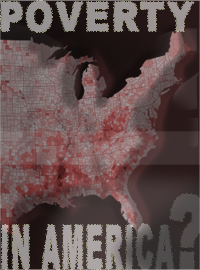| What Constitutes “Poverty” In America Today |
 |
|
By Timothy H. Lee
Thursday, August 04 2011 |
Here’s an interesting fact: The typical “poor” American enjoys substantially more housing space than the average European. Vive la France! That insight comes courtesy of the Heritage Foundation and its fascinating July 21 report entitled Air Conditioning, Cable TV and an Xbox: What is Poverty in the United States Today? So how do we define “poverty” in contemporary America? For its part, Webster’s describes poverty as, “1. Lack of the means of providing material needs or comforts. 2. Deficiency in amount: scantiness.” That seems reasonable. Or take the words of Franklin Roosevelt back in his second inaugural of January 1937, at the beginning of the welfare state as we now know it: “I see one-third of a nation ill-clad, ill-housed, and ill-nourished.” That also sounds fair enough, although Roosevelt’s agenda ended up perpetuating the Great Depression rather than ending it. By those measures, however, “relatively few of the more than 35 million people identified as living ‘in poverty’ by the Census Bureau could be characterized as poor,” according to Heritage. Back in 1964, when Lyndon Johnson commenced the “War on Poverty,” even the fabulously wealthy didn’t possess cellular phones, satellite or cable television, DVD players, microwave ovens or color television to watch the Beatles’ debut on “The Ed Sullivan Show.” The average American at the time didn’t own air conditioning. Today, most Americans now defined as “poor” own all of those things. Throughout the millennia of human history, malnourishment has been the scourge of mankind. Today, obesity disproportionately plagues lower-income Americans. In fact, as noted by the Heritage Foundation report: “Relatively few of the 35 million individuals labeled as ‘poor’ by the Census Bureau would actually be considered impoverished by the typical American. As Rector and Sheffield point out, the average poor family in America is well-housed, adequately fed, and has enough money to pay for all essential needs, including medical care. Furthermore, according to the government’s own survey data, in 2005, the average household defined as poor by the government had air conditioning, cable TV, and a family car. For entertainment, the household had two color televisions, a DVD player, and a VCR. If there were children in the home (especially boys), the family had a game system, such as an Xbox or PlayStation. In the kitchen, the household had a microwave, refrigerator, and an oven and stove. Other household conveniences included a clothes washer, clothes dryer, ceiling fans, a cordless phone, and a coffee maker.” This issue isn’t mere philosophical frolic. Nor is it an attempt to demonize anyone. Reasonable people agree that we should collectively help those who are truly impoverished, particularly those who cannot help themselves. At the same time, however, the “poor” should not be used as political pawns. They should not be exploited by demagogues to justify more federal power, more regulation of our lives, more reckless deficit spending, more dependence upon government or higher taxes. For instance, Roosevelt exploited poverty in his second inaugural to demand even more unprecedented government power, saying, “for we have begun to bring private autocratic powers into their proper subordination to the public’s government.” “Proper subordination?” Those words are hardly worthy of James Madison or Thomas Jefferson. Similarly, the poor should not be exploited today by Barack Obama as a lever to reelection. Unfortunately, the Heritage Foundation study reveals his ploy to do just that: “Sadly, President Barack Obama plans to make this situation worse by creating a new ‘poverty’ measure than deliberately severs all connection between ‘poverty’ and actual deprivation. This new measure will serve as a propaganda tool in Obama’s endless quest to ‘spread the wealth around’ and will eventually displace the current poverty measure… The current poverty measure counts (albeit inaccurately) absolute purchasing power (how much meat and potatoes a person can buy). The new measure will count comparative purchasing power (how much meat and potatoes a person can buy relative to other people). As the nation becomes wealthier, the poverty standards will increase in proportion. In other words, Obama will employ a statistical trick to give new meaning to the saying that ‘the poor will always be with you.’” Ultimately, observes Stanford scholar Victor Davis Hanson, such short-term tactics create longer-term civic rot: “The West has mostly conquered the existential poverty that plagued it for 2,500 years. Obesity, not malnutrition, is a national epidemic in the United States. But the obsession today is ensuring absolute material equality, or the impossible notion that everyone must have more or less the same things, regardless of how they are to be paid for. Behind the rioting in Greece and the demagogic speeches in Washington is the common premise that our individual well-being must be judged in relative, not absolute terms, and only in terms of material rather than spiritual wealth… In short, the more we have, the more we want, and the more we feel deprived at seeing others with more than what we have. That is at the heart of the current Western malaise, from Washington to Athens.” Continued misunderstanding and liberal demagoguery must be remedied, for the good of the truly poor and the longer-term welfare of America. |
Related Articles : |
























